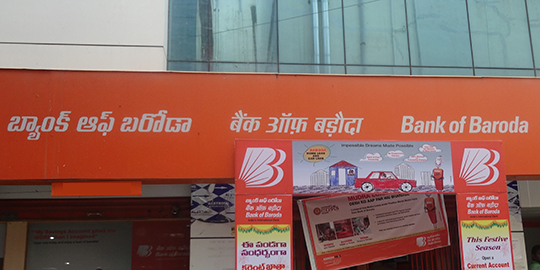
Forex scam: Bank of Baroda says branch ‘didn’t adhere’ to norms
Sai Nikesh | The Dollar Business
Soon after the startling revelation about alleged irregularities in overseas transactions worth over Rs.6,000 crore, Bank of Baroda has said that its Delhi branch failed to 'adhere to the Foreign Exchange Management Act (FEMA) guidelines while processing high-value remittance'. The Public Sector Bank said that it had found suspicious transactions involving foreign accounts through its Delhi's Ashok Vihar branch and reported the matter to the Finance Ministry, Enforcement Directorate (ED) and CBI in September. According to media reports, CBI and ED officials last week, in a series of raids, found documents related to 59 companies that opened current accounts in Bank of Baroda’s branch and transferred Rs.6,172 crore in the garb of advance payments for imports which did not take place. A total of 59 current account holders and unknown bank officials “conspired to send overseas remittances, mostly to Hong Kong, of foreign exchange” under the garb of payments towards suspected non-existent imports, a report said quoting a CBI spokesperson. On Monday, BoB issued a statement saying, that it carried out internal investigations into the case and found that the branch “did not adhere to the Foreign Exchange Management Act (FEMA) guidelines in remittances.” The Bank, however, said that the amount of remittance was much less than Rs.6,000 crore. “A total of 5,853 outward foreign remittances transactions aggregating to Rs.3500 crore happened between May 12, 2014 and August, 2015 for the purpose as 'Advance remittance for Imports’ and for other purposes, have been remitted through 38 current accounts to around 400 overseas parties, mainly based in Hong Kong and one of them in UAE,” the statement said. The bank also clarified that 59 current accounts were opened in its Ashok Vihar branch between May 13, 2014 and June 20, 2015. And, out of the total amount involved, “only about 10% has been by way of cash deposits with our branches and the rest of around 90% have been received by RTGS/NEFT from various other banks numbering over thirty”. The alleged irregularities have come to light when the government is making efforts to bring out a strict law to track the flow of black money. Speaking to The Dollar Business, Adish C. Aggarwala, President of International Council of Jurists, Chairman of All India Bar Association and Convener of Indian Council of Jurists, said, “Certain amendments are required in the working of our economic investigating agencies like ED, FEMA, and Directorate of Revenue Intelligence (DRI).” He said that officials in these agencies are normally not sensitive to any such information provided by PSUs/PSBs as they feel these transactions related to PSUs would be genuine. “However, these departments make immediate enquiries in case of issues related to private sector banks. In the current case, enquiries weren’t made in spite of the fact that the bank authorities have sent the appropriate information to the concerned agencies as required under the rules,” he noted. Experts say that black money holders tend to transfer illegal money through banks in small tranches to avoid the requirement of RBI clearance which is mandatory in cases of remittance above $100,000. To keep a tab on such small transactions, also known as structuring, Aggarwala suggested that the limit of remittance without RBI clearance should be reduced to $10,000. “This will help in curbing illegal transactions involving overseas accounts,” he added.
October 13, 2015 | 5:05pm IST.






 to success.
to success.